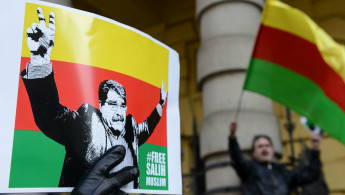Czech court releases Syrian Kurdish leader Saleh Muslim
A Czech court on Tuesday released prominent Syrian Kurdish leader Saleh Muslim, who was detained at the weekend and is wanted by Turkey on terror charges, his lawyer said.
"The judge released my client," lawyer Miroslav Krutina told reporters.
He said Muslim has vowed to participate in all extradition proceedings requested by Turkey.
The former leader of the Syrian Kurdish Democratic Union Party (PYD) is still a figurehead for Kurds in Syria.
Czech Judge Jaroslav Pytloun declined to comment on his decision, which was hailed by several dozen Kurds who had come to show solidarity with Muslim in front of the municipal court building in central Prague.
However, Turkey lashed out at the Czech judicial authorities for releasing Muslim.
"This decision is very clearly a decision in support for terrorism," Deputy Prime Minister Bekir Bozdag told reporters in Ankara, adding it would have a "negative impact" on relations between Prague and Ankara.
Earlier on Tuesday Turkey said Muslim's case was a "day of reckoning" for the Czech Republic, pressing its NATO ally Prague to extradite him to face a terror trial.
The arrest came as Turkey presses an over month-long operation inside Syria aimed at dislodging the People's Protection Units (YPG) - the military wing of the PYD - from the Afrin region of the country's north.
| Read more here: The convoluted geopolitics of the battle for Afrin |
Ankara sees the YPG and PYD as the Syrian branch of the Kurdistan Workers' Party (PKK), which for over three decades has waged an insurgency against the Turkish state and is banned by Turkey, the US and the European Union as a terror group.
Muslim is wanted by Turkey in connection with a deadly attack in Ankara in February 2016. He has denied any involvement.
Czech Prime Minister Andrej Babis declined Tuesday to comment on the case insisting that "it's a Czech court that decides, I do not know this case, I can not express myself."





 Follow the Middle East's top stories in English at The New Arab on Google News
Follow the Middle East's top stories in English at The New Arab on Google News


